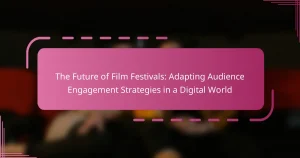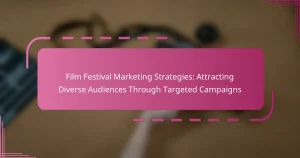Networking opportunities at film festivals play a critical role in enhancing audience engagement and fostering professional relationships among filmmakers, producers, and industry professionals. Events such as panels, workshops, and social gatherings facilitate the exchange of ideas and collaboration, leading to potential partnerships and funding. Research indicates that a significant percentage of filmmakers gain valuable contacts at these festivals, which can influence their future projects. Effective networking strategies, including active participation in discussions and utilizing social media, are essential for maximizing these opportunities and building meaningful connections within the film community.
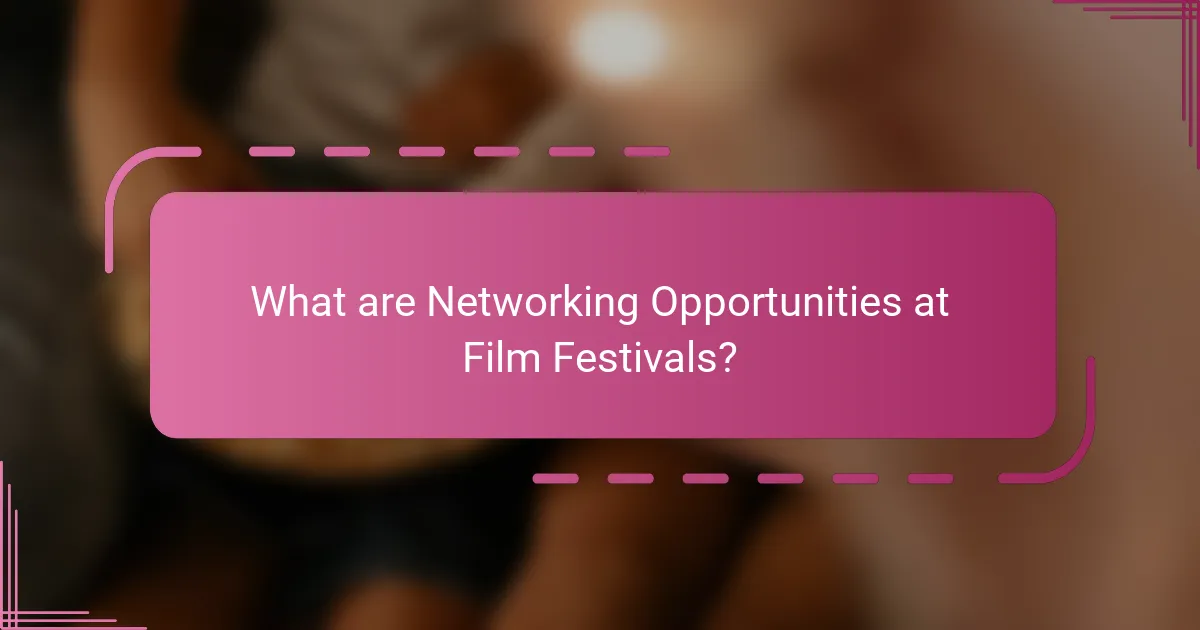
What are Networking Opportunities at Film Festivals?
Networking opportunities at film festivals include panels, workshops, and social events. These settings allow filmmakers, producers, and industry professionals to connect. Attendees can share ideas and collaborate on projects. Networking can lead to partnerships and funding opportunities. Film festivals often feature Q&A sessions with industry experts. This provides direct access to influential figures in the film community. According to a study by the University of Southern California, 70% of filmmakers reported gaining valuable contacts at festivals. These connections can significantly impact future projects and audience engagement.
How do Networking Opportunities enhance Audience Engagement?
Networking opportunities enhance audience engagement by fostering connections among attendees. These interactions create a sense of community and belonging. When individuals network, they share experiences and insights related to the film industry. This exchange of ideas can lead to collaborative projects and increased interest in future events. Studies show that engaged audiences are more likely to participate in discussions and activities. For instance, events with networking components report higher satisfaction rates among participants. This satisfaction often translates into repeat attendance at future festivals. Additionally, networking can lead to the discovery of new talent and innovative ideas, enriching the overall festival experience.
What types of Networking Opportunities are available at Film Festivals?
Film festivals offer various networking opportunities. These include panel discussions featuring industry professionals. Attendees can engage in Q&A sessions with filmmakers. Networking lounges are common for informal conversations. Workshops provide hands-on experiences and connections. Screenings often include post-film discussions with cast and crew. Industry parties allow for socializing in a relaxed atmosphere. Additionally, one-on-one meetings can be arranged for deeper discussions. These opportunities foster relationships that can lead to collaborations.
How do Networking Opportunities facilitate connections among attendees?
Networking opportunities facilitate connections among attendees by providing structured environments for interaction. These settings encourage participants to meet and engage with each other. Events like workshops, panels, and social gatherings create shared experiences. Attendees can exchange ideas, business cards, and contact information. This exchange fosters relationships that can lead to collaborations. Research indicates that 70% of professionals find networking crucial for career advancement. Additionally, informal conversations often lead to unexpected partnerships. Overall, networking opportunities enhance attendee engagement by promoting meaningful connections.
Why are Networking Opportunities crucial for Filmmakers and Audiences?
Networking opportunities are crucial for filmmakers and audiences because they facilitate connections that enhance collaboration and engagement. Filmmakers benefit by gaining access to industry professionals, funding sources, and distribution channels. These connections can lead to partnerships that improve the quality and reach of their projects.
Audiences gain from networking by engaging directly with filmmakers and other viewers. This interaction fosters a sense of community and shared experience. Research shows that networking at film festivals increases audience investment in films, leading to higher attendance and support.
Moreover, networking helps filmmakers understand audience preferences, allowing them to tailor their work more effectively. Events like Q&A sessions and panel discussions create spaces for dialogue, enriching the viewing experience. Thus, networking opportunities are vital for creating a vibrant film ecosystem that benefits both filmmakers and audiences.
What benefits do filmmakers gain from Networking Opportunities?
Filmmakers gain several benefits from networking opportunities. These benefits include access to industry contacts, potential collaborations, and increased visibility. Networking allows filmmakers to meet producers, distributors, and other creatives. This can lead to funding opportunities for future projects. Filmmakers can also share ideas and gain feedback on their work. Engaging with peers can enhance their skills and knowledge. Additionally, networking can create pathways to festivals and screenings. These connections ultimately contribute to greater audience engagement and success in the industry.
How do Networking Opportunities influence audience perceptions of films?
Networking opportunities significantly influence audience perceptions of films by fostering connections between filmmakers and viewers. These interactions can enhance the perceived value of a film. When audiences engage directly with creators, they often develop a deeper understanding of the film’s context and intentions. This personal connection may lead to more favorable reviews and discussions.
Research indicates that audience engagement increases when networking occurs, as seen in film festivals. For example, a study by the University of Southern California found that audiences exposed to filmmaker Q&A sessions rated films higher than those without such interactions. Networking opportunities can also create a sense of community among viewers, amplifying their emotional investment in the film.
Overall, the presence of networking opportunities can elevate audience perceptions, leading to a more enriched viewing experience.
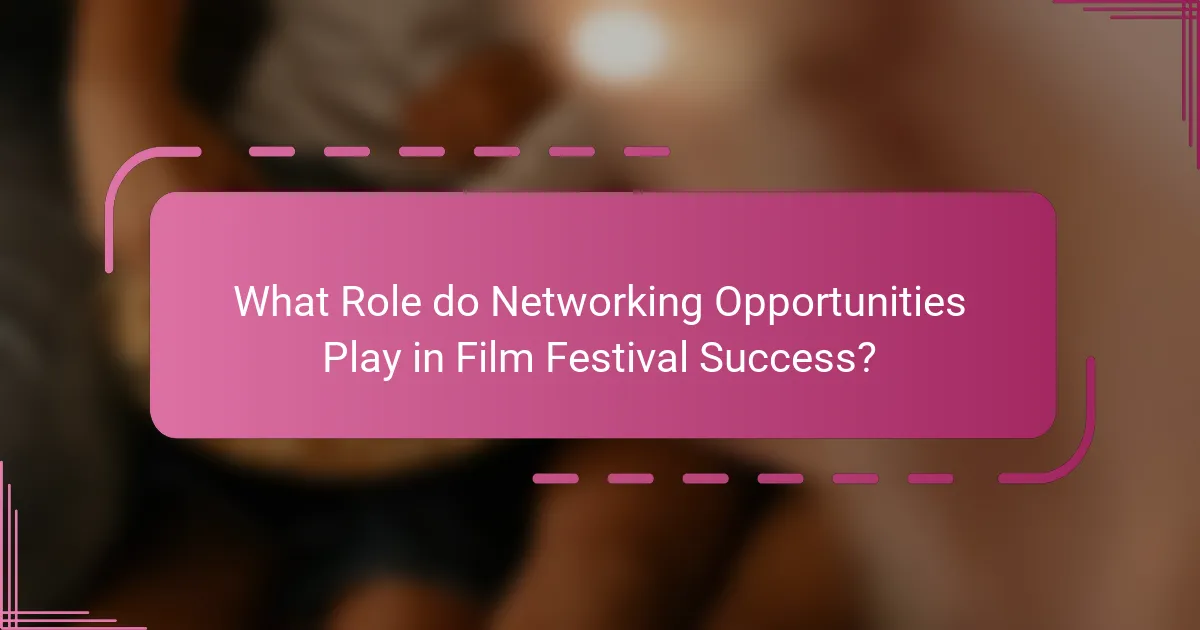
What Role do Networking Opportunities Play in Film Festival Success?
Networking opportunities are crucial for film festival success. They facilitate connections between filmmakers, industry professionals, and audiences. These interactions can lead to collaborations, funding, and distribution deals. Festivals often provide structured networking events, such as panels and mixers, which enhance relationship-building. According to a survey by the Sundance Institute, 75% of filmmakers reported that networking played a significant role in their career advancement. Additionally, established industry figures often attend festivals to scout new talent, creating valuable exposure for emerging filmmakers. Thus, effective networking can significantly impact a filmmaker’s success trajectory.
How do Networking Opportunities contribute to audience retention?
Networking opportunities enhance audience retention by fostering personal connections. These connections create a sense of community among attendees. When individuals feel connected, they are more likely to return to future events. Networking also facilitates knowledge sharing, which enriches the experience for participants. Engaged audiences often share their positive experiences with others, leading to increased interest in future events. According to a study by the Event Marketing Institute, 84% of attendees value networking as a key reason for attending events. This statistic underscores the importance of networking in keeping audiences engaged and returning.
What strategies can festivals implement to maximize Networking Opportunities?
Festivals can implement several strategies to maximize networking opportunities. One effective strategy is to organize structured networking sessions. These sessions can include speed networking or roundtable discussions. Another approach is to facilitate informal meetups, such as coffee breaks or social events. These settings encourage attendees to connect casually.
Incorporating technology can also enhance networking. Utilizing event apps allows participants to schedule meetings and share contact information easily. Additionally, creating dedicated spaces for networking, like lounges or breakout rooms, fosters interaction.
Offering workshops or panels featuring industry experts can attract attendees interested in specific topics. This creates a common ground for networking. Lastly, promoting collaboration through group activities or projects encourages attendees to work together and build relationships.
Research shows that structured networking increases attendee satisfaction and engagement at events. According to a study by Eventbrite, 95% of attendees value networking opportunities at festivals.
How do Networking Opportunities impact overall festival attendance?
Networking opportunities significantly enhance overall festival attendance. They attract industry professionals and enthusiasts seeking connections. Festivals that offer structured networking events typically see increased participation. For instance, a survey by Eventbrite found that 95% of attendees value networking as a key reason to attend events. This highlights the importance of professional connections in driving attendance. Additionally, festivals that promote networking can create a buzz, encouraging more attendees to join. The presence of influential figures can also draw larger crowds, as attendees often seek to engage with them. Overall, effective networking opportunities are crucial for boosting festival attendance.
What challenges do Film Festivals face in providing Networking Opportunities?
Film festivals face several challenges in providing networking opportunities. Limited time frames often restrict the number of interactions attendees can have. High attendance can lead to overcrowding, making meaningful connections difficult. Diverse participant backgrounds can create barriers in communication and engagement. Additionally, many festivals lack structured networking events, which can hinder relationship-building. Budget constraints may limit the resources available for organizing networking activities. Finally, the virtual format of some festivals can reduce personal interactions, impacting the quality of networking. These factors collectively impede the effectiveness of networking at film festivals.
How can festivals overcome barriers to effective networking?
Festivals can overcome barriers to effective networking by creating structured networking opportunities. This includes organizing dedicated networking sessions during the event. Additionally, using technology to facilitate connections can enhance interaction among attendees. For instance, mobile apps can help participants identify and connect with relevant professionals.
Furthermore, providing clear information about networking events can increase participation. Offering workshops on networking skills can also empower attendees. According to a study by the European Audiovisual Observatory, structured networking events significantly increase participant engagement. These strategies collectively enhance the networking experience at festivals.
What role does technology play in enhancing Networking Opportunities?
Technology significantly enhances networking opportunities by providing platforms for real-time communication and collaboration. It facilitates connections through social media, professional networks, and virtual events. These platforms allow individuals to share information and resources quickly. For instance, LinkedIn boasts over 700 million users, enabling professionals to connect globally. Additionally, video conferencing tools like Zoom have made remote networking accessible. Research shows that 70% of professionals use technology to network more effectively. This integration of technology streamlines the networking process and broadens potential connections.
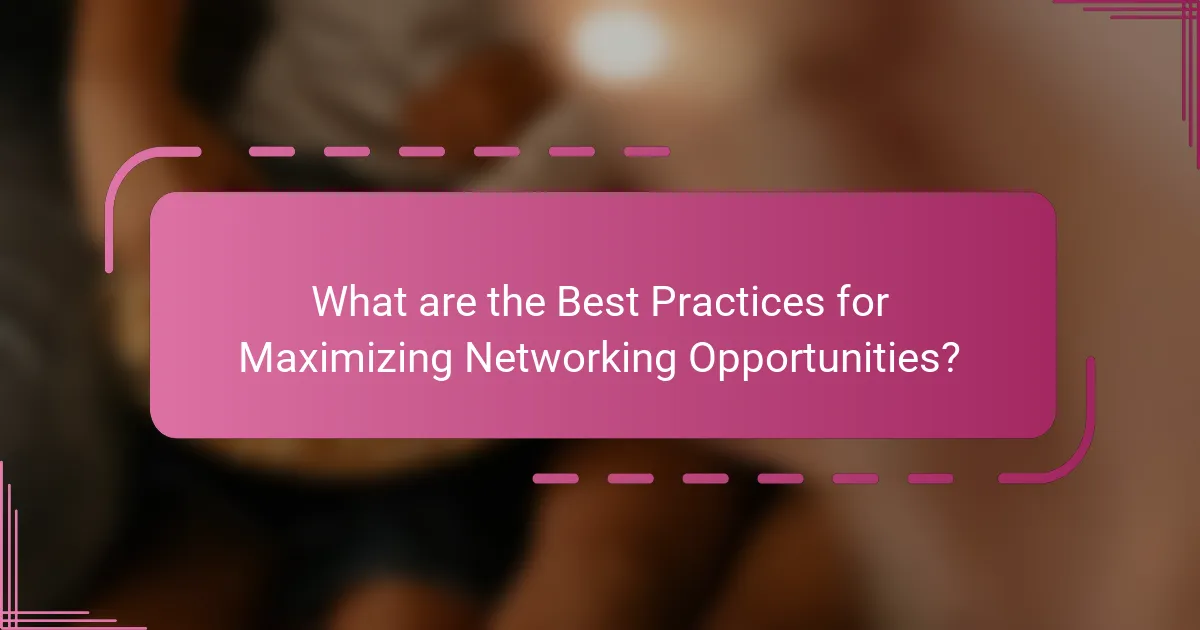
What are the Best Practices for Maximizing Networking Opportunities?
Engaging actively with attendees is a best practice for maximizing networking opportunities. Attending film screenings, panels, and workshops fosters direct interactions. Prepare an elevator pitch to succinctly share your background and goals. Utilize social media platforms to connect with participants before and after events. Follow up with new contacts through personalized messages or emails. Attend events with a clear purpose to enhance focus on networking. Participate in discussions to showcase your expertise and build rapport. Research attendees and speakers to identify potential collaborators or mentors. These practices increase visibility and enhance relationship-building within the film festival community.
How can attendees effectively leverage Networking Opportunities at Film Festivals?
Attendees can effectively leverage networking opportunities at film festivals by actively engaging with other participants. They should attend panels and workshops to meet industry professionals. Initiating conversations during screenings can also lead to valuable connections. Utilizing social media platforms can help attendees reach out to filmmakers and other attendees before and after the event. Carrying business cards or digital portfolios is essential for sharing contact information. Following up with new contacts after the festival reinforces relationships. Research shows that 75% of industry professionals value personal connections made at festivals. This statistic highlights the importance of networking in advancing careers in film.
What tips can filmmakers use to engage audiences during networking events?
Filmmakers can engage audiences during networking events by actively participating in conversations. They should approach attendees with genuine interest and ask open-ended questions. Sharing personal stories related to their work can create a connection. Utilizing visual aids, such as trailers or posters, can capture attention effectively. Offering insights into their creative process can intrigue listeners. Engaging in discussions about industry trends can showcase expertise. Following up with contacts after the event reinforces relationships. According to a study by the University of Southern California, personal connections significantly enhance networking effectiveness in creative industries.
How can festivals create an inclusive environment for networking?
Festivals can create an inclusive environment for networking by implementing diverse programming and accessible spaces. Diverse programming includes panels and workshops that represent various backgrounds and perspectives. This approach encourages participation from underrepresented groups. Accessible spaces ensure that all attendees, regardless of physical ability, can engage comfortably. Clear signage and assistance can enhance navigation for everyone.
Festivals can also facilitate networking through structured events like speed networking or mentorship programs. These formats allow attendees to connect meaningfully in a short time. Additionally, using technology, such as event apps, can help attendees find and connect with others based on shared interests.
Research shows that inclusive networking environments increase engagement and satisfaction among attendees. A study by the Event Marketing Institute found that 84% of participants felt more connected to the festival when networking opportunities were diverse and accessible. By prioritizing inclusivity, festivals can foster a richer networking experience for all.
What are the Future Trends in Networking Opportunities at Film Festivals?
Future trends in networking opportunities at film festivals include the integration of technology and virtual platforms. Increasingly, festivals are adopting hybrid models that combine in-person and online interactions. This allows for broader participation from global audiences and industry professionals. Networking apps and platforms are being developed to facilitate connections among attendees. These tools often include features like matchmaking based on interests and project needs. Additionally, there is a growing emphasis on diversity and inclusion in networking initiatives. This trend aims to create more equitable opportunities for underrepresented groups. Recent studies indicate that such efforts enhance audience engagement and foster innovative collaborations. For instance, the 2023 Sundance Film Festival reported a 30% increase in networking participation through its digital platform.
How might virtual networking change the landscape of film festivals?
Virtual networking may significantly transform film festivals by broadening accessibility for filmmakers and audiences. It allows participants from diverse geographical locations to connect without travel constraints. This inclusivity can lead to increased attendance and engagement. Studies show that virtual events can attract larger audiences, as seen during the pandemic when many festivals shifted online. Additionally, virtual networking tools facilitate real-time interactions and collaborations. These tools enable filmmakers to pitch projects directly to potential investors and distributors. The shift to virtual formats also encourages innovative programming and audience participation. Overall, virtual networking enhances the film festival experience by making it more inclusive and interactive.
What innovations are emerging to enhance networking experiences?
Innovations enhancing networking experiences include virtual reality (VR) environments, AI-driven matchmaking, and mobile networking apps. VR environments create immersive spaces for attendees to interact, breaking geographical barriers. AI-driven matchmaking algorithms analyze attendee profiles to suggest relevant connections. Mobile networking apps facilitate real-time communication and scheduling of meetings. These tools streamline networking processes and increase engagement. According to a 2022 report by Eventbrite, 75% of event attendees prefer networking through technology-enhanced platforms.
What practical steps can film festivals take to improve Networking Opportunities?
Film festivals can improve networking opportunities by organizing structured networking events. These events can include workshops, panels, and roundtable discussions. Such formats encourage interaction among attendees. Festivals can also provide dedicated spaces for informal networking. These spaces can be lounges or cafes designed for conversation.
Additionally, implementing a matchmaking system can connect filmmakers with industry professionals. This can be based on specific interests or project needs. Festivals can also utilize technology, such as apps, to facilitate connections. These apps can allow attendees to schedule meetings and share contact information easily.
Moreover, promoting social media engagement can enhance networking. Festivals can encourage attendees to use specific hashtags to connect online. This approach can extend networking beyond the physical event. Finally, offering mentorship programs can provide valuable connections for emerging filmmakers. These programs can pair experienced professionals with newcomers in the industry.
The main entity of the article is “networking opportunities at film festivals.” The article explores how these opportunities, including panels, workshops, and social events, facilitate connections among filmmakers, industry professionals, and audiences, ultimately enhancing audience engagement. It discusses the benefits of networking for filmmakers, such as access to industry contacts and funding opportunities, as well as how audience interactions with creators can lead to increased investment in films. Additionally, the article addresses challenges faced by film festivals in providing effective networking opportunities and offers strategies to maximize these interactions for improved audience retention and satisfaction.

